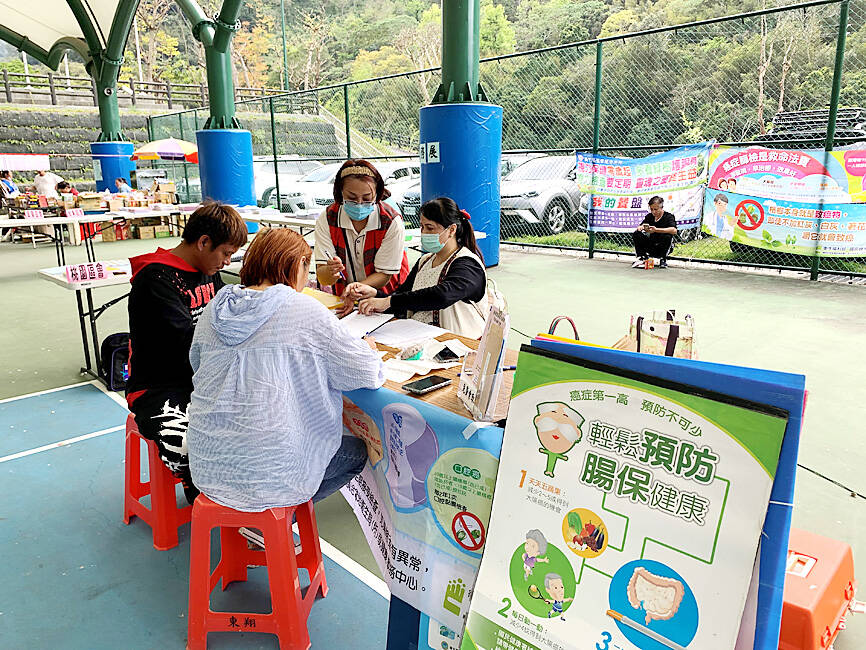A Taipei Medical University research team found that the hemoglobin concentration levels resulting from fecal occult blood tests (FOBT) can predict the risk and mortality of colorectal cancer, and could be used to suggest the interval between screenings.
The research team was led by the university’s College of Oral Medicine associate dean Sam Chen (陳立昇) and Amy Yen (嚴明芳), and the study was published in May in JAMA Oncology, a monthly peer-reviewed medical journal.
Colorectal cancer was the third leading cause of cancer deaths in Taiwan last year, Chen said, adding that government-funded FOBT is offered every two years to people aged 50 to 74 for routine screening of colorectal cancer.

Photo courtesy of the Hsinchu County Government
The cohort study included data from more than 3.5 million people who received the FOBT from 2004 and 2014, and followed up until 2019. It analyzed the data to study the relationship between fecal hemoglobin concentration and colorectal tumors, and death from colorectal cancer.
Chen said they found that increasing fecal hemoglobin concentration levels indicate more colorectal tumors and higher colorectal cancer mortality risk, allowing for stratification of risk groups, and can be used for calibrating suitable screening intervals.
Usually, a hemoglobin concentration level above 20mcg/g is considered positive, with a higher risk of cancer and requiring a colonoscopy follow-up, he said.
About half of those who had a positive FOBT result were detected to have polyps in a colonoscopy follow-up, while about 20 percent had progressive polyps, and about 5 percent had colorectal cancer, he said.
Chen said their study found that fecal hemoglobin concentration levels can be used to more accurately assess colorectal cancer risk and mortality rates, and to personalize screening intervals, with shorter intervals for higher fecal hemoglobin levels.
The biennial FOBT has been proven to reduce the risk of late-stage colorectal cancer by 29 percent and the risk of colorectal cancer death by 35 percent, he said.
Their findings further demonstrated how to achieve precision inter-screening intervals for optimizing the use of FOBT and colonoscopy, he said.
With personalized fecal hemoglobin concentration screening, FOBTs can be reduced by 49 percent and colonoscopies by 28 percent, he said, adding that this could optimize medical resources, and reduce unnecessary testing and risks while ensuring that high-risk groups get necessary testing and treatment promptly.

A preclearance service to facilitate entry for people traveling to select airports in Japan would be available from Thursday next week to Feb. 25 at Taiwan Taoyuan International Airport, Taoyuan International Airport Corp (TIAC) said on Tuesday. The service was first made available to Taiwanese travelers throughout the winter vacation of 2024 and during the Lunar New Year holiday. In addition to flights to the Japanese cities of Hakodate, Asahikawa, Akita, Sendai, Niigata, Okayama, Takamatsu, Kumamoto and Kagoshima, the service would be available to travelers to Kobe and Oita. The service can be accessed by passengers of 15 flight routes operated by

GIVE AND TAKE: Blood demand continues to rise each year, while fewer young donors are available due to the nation’s falling birthrate, a doctor said Blood donors can redeem points earned from donations to obtain limited edition Formosan black bear travel mugs, the Kaohsiung Blood Center said yesterday, as it announced a goal of stocking 20,000 units of blood prior to the Lunar New Year. The last month of the lunar year is National Blood Donation Month, when local centers seek to stockpile blood for use during the Lunar New Year holiday. The blood demand in southern Taiwan — including Tainan and Kaohsiung, as well as Chiayi, Pingtung, Penghu and Taitung counties — is about 2,000 units per day, the center said. The donation campaign aims to boost

ENHANCING EFFICIENCY: The apron can accommodate 16 airplanes overnight at Taoyuan airport while work on the third runway continues, the transport minister said A new temporary overnight parking apron at Taiwan Taoyuan International Airport is to start operating on Friday next week to boost operational efficiency while the third runway is being constructed, the Ministry of Transportation and Communications said yesterday. The apron — one of the crucial projects in the construction of the third runway — can accommodate 16 aircraft overnight at the nation’s largest international airport, Minister of Transportation and Communications Chen Shih-kai (陳世凱) told reporters while inspecting the new facility yesterday morning. Aside from providing the airport operator with greater flexibility in aircraft parking during the third runway construction,

American climber Alex Honnold is to attempt a free climb of Taipei 101 today at 9am, with traffic closures around the skyscraper. To accommodate the climb attempt and filming, the Taipei Department of Transportation said traffic controls would be enforced around the Taipei 101 area. If weather conditions delay the climb, the restrictions would be pushed back to tomorrow. Traffic controls would be in place today from 7am to 11am around the Taipei 101 area, the department said. Songzhi Road would be fully closed in both directions between Songlian Road and Xinyi Road Sec 5, it said, adding that bidirectional traffic controls would